Killer furniture, dark undercurrents.. I say it's time for Hungary's first Wraith King! Bwahahahah 

The Incorrupt Hand: a Comedy of Árpáds
- Thread starter Farquharson
- Start date
-
We have updated our Community Code of Conduct. Please read through the new rules for the forum that are an integral part of Paradox Interactive’s User Agreement.
You are using an out of date browser. It may not display this or other websites correctly.
You should upgrade or use an alternative browser.
You should upgrade or use an alternative browser.
Nicely done. I agree that there is no reason to hurry with the king title... Salamon dies in 9 out of 10 games before Géza does.
I just hope that you are NOT going to get rid of Géza's brother - László as well... It would make me very sad...
Any plans to 'by-pass' little Kálmán's spot in the succession order in favour of one of his less deformed brothers?
Slovakia is a relatively weel off Dutchy, have you considered crusading North into Baltic? There's a lot of pagans just asking to be attacked. And better you then some teutonic templar! 
coz1: Well, concerning the effects of revoking titles, all I've noticed is a sudden drop in the loyalty of my other vassals at the time. Géza is now wallowing in prestige however, and the loyalty drop is easily recovered in a matter of months. Is there a longer term effect, though? These are the things I need to know! 
Maccavelli: Let's hope I can finish this one first! Glad you like it so far, though.
stnylan: No-one's actually gone batty yet, but I'm already extremely proud of my nice, dysfunctional family - it's all grist for the mill!
jwolf: On revoking titles, I await replies from those more experienced than me. The title is not automatically surrendered and the liege receives a prestige drop every time he fails, so that's one drawback. Another is that your other vassals tend to get the jitters. The pay-off is that you get more revenue when you control the provinces directly - up to your limit in terms of number of provinces, which Géza has now reached.
Grundius: Perhaps someone could develop a CK mod that allowed for kings to remain ruling after they're dead!
siekel: Don't worry about László - Géza has no need to see him as a threat. As for his own expected longevity, have no fears. Duke Géza is eating Flora margarine and feeling pretty upbeat about getting to the throne in person.
Troggle: What? Are you suggesting I assassinate my own son??? Well, I'm sure Borbala would have a Flamboyant Scheme ready at the drop of a hat, but I wasn't planning it.
Semi-Lobster: I hadn't thought of crusading in the Baltic, but thanks - I'll keep that in mind.
bluelotus: You're right. With the Árpád family in power, the citizens of Slovakia aren't too worried about their daughters, but they sure as heck keep their pets safely locked up at night!
Well, the game has got quite interesting in the next few years and I'm starting to have questions to ask the experts about gameplay, which has motivated me to push on with the next update - coming tomorrow, I hope!
Maccavelli: Let's hope I can finish this one first! Glad you like it so far, though.
stnylan: No-one's actually gone batty yet, but I'm already extremely proud of my nice, dysfunctional family - it's all grist for the mill!
jwolf: On revoking titles, I await replies from those more experienced than me. The title is not automatically surrendered and the liege receives a prestige drop every time he fails, so that's one drawback. Another is that your other vassals tend to get the jitters. The pay-off is that you get more revenue when you control the provinces directly - up to your limit in terms of number of provinces, which Géza has now reached.
Grundius: Perhaps someone could develop a CK mod that allowed for kings to remain ruling after they're dead!
siekel: Don't worry about László - Géza has no need to see him as a threat. As for his own expected longevity, have no fears. Duke Géza is eating Flora margarine and feeling pretty upbeat about getting to the throne in person.
Troggle: What? Are you suggesting I assassinate my own son??? Well, I'm sure Borbala would have a Flamboyant Scheme ready at the drop of a hat, but I wasn't planning it.
Semi-Lobster: I hadn't thought of crusading in the Baltic, but thanks - I'll keep that in mind.
bluelotus: You're right. With the Árpád family in power, the citizens of Slovakia aren't too worried about their daughters, but they sure as heck keep their pets safely locked up at night!
Well, the game has got quite interesting in the next few years and I'm starting to have questions to ask the experts about gameplay, which has motivated me to push on with the next update - coming tomorrow, I hope!
Chapter Three: 1080-86
The Incorrupt Hand
The Incorrupt Hand
It was about this time that the Tirgoviste Communist Thieves Co-operative started up operations in the former Pecheneg territories to the south-east. The ringleader, a certain Róbin the Hud, indulged in such seditious criminal activities as robbing the rich and giving to the poor. Clearly if this sort of thing was allowed to continue all manner of undesirable consequences might result. For example, the poor might stop being poor, and some rich people would no longer be rich. Duke Géza acted fast, setting up a local vigilante group calling themselves “Commie Interrogators Anonymous” or C.I.A. for short. They were headed up by an extremely efficient individual known only as Agent Szmit.
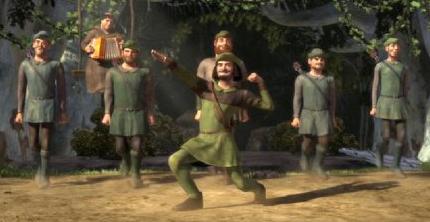
Members of the Tirgoviste Communist Thieves Co-operative

Agent Szmit - civilization’s last hope against the creeping menace
It was a day of celebration when the Hud was finally tracked down in his forest hideout and brought in for interrogation. Insisting that he would not speak until he had called his lawyer, he suddenly found himself with no mouth. In a flash of insight he began to wonder if the entire world around him was nothing more than a vast and elaborate computer construct being fed into his brain by a race of machines. In fact, perhaps he himself was nothing more than a computer-generated animation. As the happy vista of a whole new career in philosophy and metaphysics opened before him he began trying to communicate this to Agent Szmit by sign language. Alas he failed in this rather difficult venture, and was summarily tried and executed the next day. His followers quickly dispersed and were never seen again.
In 1081 Duke Géza’s eldest son Kálmán the hunchback completed his education and graduated as an Intricate Webweaver. Meanwhile his next son, the aggressive young Sándor, seemed to be taking an interest in religion. It was he who first complained of the total lack of Hungarian Saints. Why had the Pope not seen fit to canonize any of the great heroes of Hungary’s short but glorious Christian past? This was at least slightly easier than other questions children tended to ask like “Who made God?”, and so on. It did in fact start Duke Géza thinking. A few Saints in the family were just what the Árpád dynasty could do with.
King Stephen I seemed like a good candidate to start with, so the Pope was duly petitioned and agreed almost immediately. Saint Stephen was officially named the Patron Saint of Hungary and his remains instantly became one of the most precious commodities in the Kingdom. It was Duke Géza’s brother Count László of Bihar who undertook to personally dig them up from their resting place in Szekesfehervar to check they were all there. Not surprisingly, in view of Stephen’s extreme saintliness, it turned out that his right hand had miraculously suffered no decomposition whatever. László quickly had the incorrupt hand detached and stored at a secure location in Bihar, a symbol of the pure, unsullied reign of the House of Árpád. For those with a penchant for thousand-year-old severed limbs, it can still be seen today in Saint Stephen’s Cathedral in Budapest, still totally incorrupt of course.

The next task was to find a suitable wife for Kálmán, so Chancellor Matild was sent in search of the right girl. Her first port of call was the County of Opole in POland, where the unmarried Countess Eufrozyna gave her a guarded welcome:
Countess Eufrozyna of Opole: In line for the throne of Hungary, you say?
Chancellor Matild of Slovakia: There is little doubt of it, my lady. And such a handsome profile, I’m sure you’ll agree...
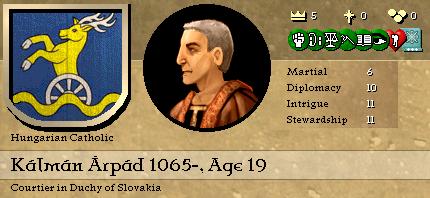
Countess Eufrozyna: Well, not bad, I suppose. What about his ability in affairs of state?
Chancellor Matild: Oh, quite the young webweaver, my lady - it’ll be never a dull moment with our Kálmán at the helm, have no fear of that!
Countess Eufrozyna: Well, that sounds promising. Any particular traits, habits... deformities, perhaps? Best to know as much as possible in advance, isn’t it?
Chancellor Matild: Ahem... well, that’s to say...
Countess Eufrozyna: Ah. There is Something I Should Know, perhaps?
Chancellor Matild: Er... Well, he’s wise and just - as all future Kings should be, my lady.
Countess Eufrozyna: Why do I get the impression that’s not the Something?
Chancellor Matild: OK, he can be suspicious - no bad thing at times, though as I’m sure you’ll agree.
Countess Eufrozyna: Is that all? Just suspicious?
Chancellor Matild: A teensy bit selfish at times, too. And vengeful on occasions...
Countess Eufrozyna: Sounds like he has more character traits than a schizophrenic on steroids. I do sense that there’s Something you’re still not letting on about though.
Chancellor Matild: Well, yes OK... there’s the Pet Killers’ Club. I suppose you ought to know about that - just a bit of harmless fun between Kálmán and his young stepbrother though, really. It’s probably a healthy sign of... of... something or other...
Countess Eufrozyna: Pet Killers’ Club, eh? So the guy has a sadistic streak - could be kinky, I suppose. Well, I’ll think about it and let you know. That is, if that’s all you have to tell me - everything OK on the physical side, I take it?
Chancellor Matild: Oh yes, yes... That is, almost everything...
Countess Eufrozyna: Ah-hah! Now we’ve got to the bottom of it! Out with it then - what’s he got? A glass eye? Six toes per foot? Chronic dandruff?
Chancellor Matild: Just a... just a slight hunchback, my lady.
Countess Eufrozyna: Slight?
Chancellor Matild: Medium-sized, perhaps.
Countess Eufrozyna: Large, even?
Chancellor Matild: Well, these things are relative, my lady...
Countess Eufrozyna: Medium-sized relative to a large dromedary, you mean?
Chancellor Matild: Oh dear, please don’t hold it against him, my lady. The poor lad’s mother died in childbirth... * she chokes back a sob and wipes a tear from her eye * The little mite only survived himself by the grace of God.
Countess Eufrozyna, completely unmoved: Well, I’m sorry to say that “Pity” isn’t one of my own strongpoints. Let’s just say - don’t call us, we’ll call you...
Needless to say, the Countess didn’t actually call back. In fact, word soon got around the courts of Europe that the young hunchback of Slovakia was looking for a bride - to titters and sniggers all round. Try as she might Matild could not convince anyone to wed the future King of Hungary. In the end, she gave up in disgust and returned home to Géza’s ducal court in Gemer. Back home it was business as usual. István had now joined the Pet Killers’ Club as well, and like his brother János he was now also wallowing in childhood stress. Sándor, the hopeful young army lad who preferred the idea of killing people to pets, had just turned out to be a knowledged tactician. And then the unthinkable happened.
Duke Géza, a sprightly forty-five years old, suddenly died of old age.
Just like that. No illness, no stress, no assassin. He even used Flora margarine. But on August 15th 1085, a warm summer’s day with the sun shining and his stressed children happily killing pets in the garden, Duke Géza’s body decided it was time to shut down. So it did.
It was a terrible blow for the Duchy of Slovakia, for the old Duke had been much loved, almost venerated. Indeed, he was instantly canonized, so pious a life had he lived. For example, he had never been known to kill a single pet, which made him quite stand out amongst his immediate family. Kálmán, on the other hand, was not quite so easy to like. Quite difficult to like, in fact - especially if you happened to be the dog-loving Ivánka Szemere, Count of Orava and Kálmán’s only vassal apart from his Uncle László, Count of Bihar. Count Ivánka had been devotedly loyal to Géza but he hated the young hunchback with a vengeance.
But just as the young Duke Kálmán was pondering what to do about this, two more important events happened in rapid succession. In December 1085, and perhaps in honour of their late and canonized former liege, the pagan Pechenegs of Tirgoviste decided to become Catholic. Kálmán reaped the benefit of this by way of a massive injection of piety points. This was quite useful to have under his belt, for the next thing that happened was that, in January 1086, the Pope called for a Crusade.
Duke Kálmán decided to postpone beating up Muslims for the time being, however, while he dealt with his troublesome vassal. He tried to revoke the Count’s title, and was unsurprised by the venomous response he got. So the host was mobilized and war was declared. Of course, King Salamon of Hungary also declared war on Orava, bringing in his ally King Boleslaw of Poland. Count Ivánka’s 102 brave soldiers stood in Orava waiting for the onslaught. The Count of Beleg, one of King Salamon’s vassals who had entered a rather misguided alliance with Count Ivánka, duly declared war on Poland.
The host of Slovakia now marched to war led by the young Duke with his Marshal, Elemér Lauri at his side. It was of course all over in a few months. The only question was which of the armies now converging on Orava would end up controlling it. As it happened, the Slovakian host arrived first and everyone else then seemed to lose interest. Duke Kálmán therefore captured the town in July and Count Ivánka capitulated. To show his vengeful streak, the Duke had all pets in the town slaughtered in the market square - it was a grim day for Orava. Meanwhile Marshal Elemér, who unfortunately was both a tough soldier and a coward, came home from his first war suffering from stress. He was quickly replaced as Marshal by Sándor who had fought bravely and had had a whale of a time.
Now Kálmán the Hunchback had a little more going for him as a prospective husband. He was now a Duke, for a start, and the christianization of Tirgoviste just after his accession had made him look quite pious. Now the efficient way he dealt with an unruly vassal had given him prestige as well. And the girl he’d had a crush on for years had just come of age - Viola Trpimirovic, sweet sixteen, only child of the fifty-six year old Duke Zvonimir Dmitar of Slavonia, liked killing pets as well. And she was gorgeous. She said yes almost immediately and Kálmán was in seventh heaven. Not only had he found a beautiful pet-killing wife, but their children would alsmot certainly rule both Hungary and Slavonia. It was a historic moment for the Árpád family.
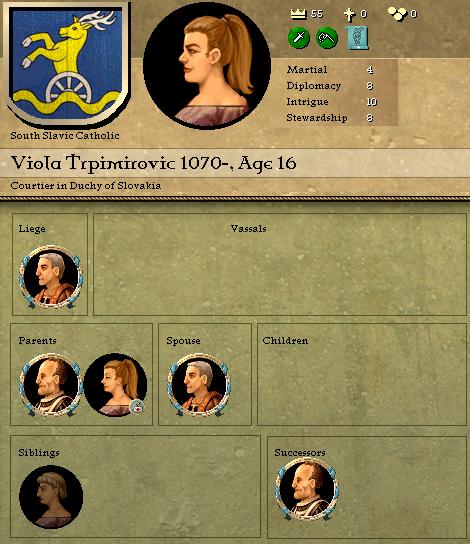
Beautiful, deceitful, cruel, a naive puppetmaster - Viola was the perfect wife for Kálmán
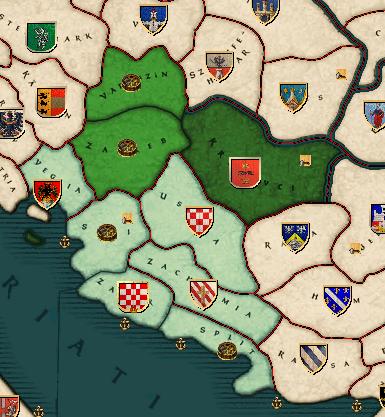
The Duke of Slavonia’s lands, one third of the Kingdom of Croatia
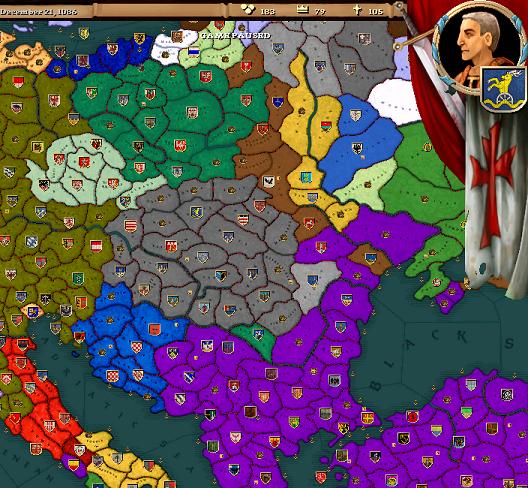
The situation in 1086 - note the newly independent Kingdom of Bohemia to the northwest of Hungary
Last edited:
OK folks, and now for some questions.
1) Can anyone tell me why Count Ivanka was so disloyal after Kalman's accession? The help window showed that the "character traits" factor had dropped from +3.3 under Geza to -4.0 under Kalman. Anyway, his loyalty was falling even with scutage at 0 so I was bound to lose him eventually.
2) I was amazed that Viola agreed to marry hunchbacked Kalman, after all the other refusals I'd had. Does it make a huge difference that he was actually Duke rather than just first in line?
3) Viola's father, the Duke of Slavonia, is currently heirless. Am I right in thinking that if Kalman and Viola have a son before he dies, that son has a good chance of becoming Duke of Slavonia? And what happens to the title if Viola's father dies before they have children?
All help gratefully received!
1) Can anyone tell me why Count Ivanka was so disloyal after Kalman's accession? The help window showed that the "character traits" factor had dropped from +3.3 under Geza to -4.0 under Kalman. Anyway, his loyalty was falling even with scutage at 0 so I was bound to lose him eventually.
2) I was amazed that Viola agreed to marry hunchbacked Kalman, after all the other refusals I'd had. Does it make a huge difference that he was actually Duke rather than just first in line?
3) Viola's father, the Duke of Slavonia, is currently heirless. Am I right in thinking that if Kalman and Viola have a son before he dies, that son has a good chance of becoming Duke of Slavonia? And what happens to the title if Viola's father dies before they have children?
All help gratefully received!
1) My guess is that whatever character traits the count of Ivanka had conflicted with those of Kalman. Sometimes the chemistry just ends up being explosive I guess
2) from my experience, yes. As they say - you can't see them when the candle's blown out.
3) Depends on the succession law. If it's semisalic primogeniture then yes. Of course, the easiest way to check is wait for the happy couple of have a son, and then see if he jumps the queue on the list of the Duke of Slavonia's successors.
The interesting thing about that though, I think, is that if the child inherits Slavonia before Kalman dies, and then inherits Kalman, Slavonia/Slovakia will remain vassals of the King of Croatia and not the King of Hungary.
2) from my experience, yes. As they say - you can't see them when the candle's blown out.
3) Depends on the succession law. If it's semisalic primogeniture then yes. Of course, the easiest way to check is wait for the happy couple of have a son, and then see if he jumps the queue on the list of the Duke of Slavonia's successors.
The interesting thing about that though, I think, is that if the child inherits Slavonia before Kalman dies, and then inherits Kalman, Slavonia/Slovakia will remain vassals of the King of Croatia and not the King of Hungary.
C.I.A , Pet Killers' club .... i like this AAr  Great update , and long live to Kálmán!
Great update , and long live to Kálmán!
stnylan said:The interesting thing about that though, I think, is that if the child inherits Slavonia before Kalman dies, and then inherits Kalman, Slavonia/Slovakia will remain vassals of the King of Croatia and not the King of Hungary.
Actually no - the player will always keep the title he started with as primary, unless he gets a higher tier one. So in this case, with the player's primary title being Slovakia, it will remain a vassal of Hungary no matter which other duchies he gets.
A good move to marry into Trpimirovic family! Not only you will get Slavonia, but also a lot of heirs - Trpimirovics have usually biiiig fertility rate (they are like rabbits)...
Nice moving, Farq! Things are moving along nicely and quite lively. Can't wait to see what happens next! 
Lot's happening there. I am not sure I can answer all your questions with any trrue authority, but I do know that whenever there is a succession, the vassals will always be less loyal to start. I think stnylan has it right that there are other conflicting traits invloved there as well. You can do a scroll over of the loyalty score and it will tell you what is causing the disloyalty I believe. Oh, and I don't think there are long term issues with revoking titles other than immediate disloyalty and BB points added. But they do add up if several attempts are done close together.
As for the marriage proposal, I think the benefits of being Duke, having a higher prestige, etc. all came together to get a "yes" this time. But I'll be damned if I have ever truly figured that out.
And as for three, yes unless the the father in law ends up having a son of his own and depending on the succession laws. Once you have a son, check the father in laws screen and see who is supposed to inherit. Then keep it that way if it's your son.
I imagine there are far more schooled folks around here that will have better, or at least more clear answers for you. Good update.
As for the marriage proposal, I think the benefits of being Duke, having a higher prestige, etc. all came together to get a "yes" this time. But I'll be damned if I have ever truly figured that out.
And as for three, yes unless the the father in law ends up having a son of his own and depending on the succession laws. Once you have a son, check the father in laws screen and see who is supposed to inherit. Then keep it that way if it's your son.
I imagine there are far more schooled folks around here that will have better, or at least more clear answers for you. Good update.
I wasn't suggesting you assassinate Kálmán per se, (though I'm sure Borbala would have rigged up an exploding Ottoman of some sort), but change your succession laws so another child would move to the top of the list. This is all moot now, and upon seeing Kálmán's stats, I wouldn't have suggested it.
I think Kalman's first marriage rejection may have been caused by his attempt to marry a countess. As I understand it, if a single woman gets a title, she will not afterwards take a husband.
stnylan: Thanks for those useful answers! I did look at how Kálmán's traits matched up with Ivánka's and couldn't see anything obvious (apart from the good old hunchback that no-one likes of course). Anyway, it was the first time I'd seen a vassal's loyalty just draining away for no apparent reason!
bluelotus: Long live Kálmán, indeed! Although I don't know if the hunchback might tend to shorten his life? He should provide some entertainment meantime though!
Solmyr: Thanks for that clarification. I didn't specially want to end up a vassal of the King of Croatia!
siekel: Nice to know about the Trpimirovic family. However, the old Duke doesn't seem to be too representative in that case, with his one daughter and no sons!
Draco: I can't wait either - I was so impatient to find out about the Slavonian succession that I loaded as the Duke of Slavonia to see what law they were using. (But I'm not telling you now - that would spoil the suspense! )
)
coz1: It was the scroll over that told me about the "Character traits" factor being the main cause of Ivánka's disloyalty, but alas, it didn't explain which character traits... Regarding the succession, I'm still wondering what happens if the Duke dies with no heirs - his "Successors" window is completely empty. I'm guessing the King of Croatia takes the title and lands, but I suppose he may then allocate them to someone else in his court? And what if Kálmán and Viola then have a son? Might he have a claim on the title but have to fight the King of Croatia for it?
Troggle: Exploding Ottoman - I like it! I may just use that... And you're right, apart from his obvious low martial score Kálmán's stats are actually pretty nice - and with his brother Sándor as Marshal that makes it up a bit.
I may just use that... And you're right, apart from his obvious low martial score Kálmán's stats are actually pretty nice - and with his brother Sándor as Marshal that makes it up a bit.
Cat Frightener: Useful to know - I did wonder. But he got refused by about ten others who weren't Countesses as well, so it wasn't the only factor!
bluelotus: Long live Kálmán, indeed! Although I don't know if the hunchback might tend to shorten his life? He should provide some entertainment meantime though!
Solmyr: Thanks for that clarification. I didn't specially want to end up a vassal of the King of Croatia!
siekel: Nice to know about the Trpimirovic family. However, the old Duke doesn't seem to be too representative in that case, with his one daughter and no sons!
Draco: I can't wait either - I was so impatient to find out about the Slavonian succession that I loaded as the Duke of Slavonia to see what law they were using. (But I'm not telling you now - that would spoil the suspense!
coz1: It was the scroll over that told me about the "Character traits" factor being the main cause of Ivánka's disloyalty, but alas, it didn't explain which character traits... Regarding the succession, I'm still wondering what happens if the Duke dies with no heirs - his "Successors" window is completely empty. I'm guessing the King of Croatia takes the title and lands, but I suppose he may then allocate them to someone else in his court? And what if Kálmán and Viola then have a son? Might he have a claim on the title but have to fight the King of Croatia for it?
Troggle: Exploding Ottoman - I like it!
Cat Frightener: Useful to know - I did wonder. But he got refused by about ten others who weren't Countesses as well, so it wasn't the only factor!
If his successor window is empty, it means some randomly generated 'cousin' will ascend the throne. The cousin will have the same dynasty name but will not have any relations at all (much like the courtiers who are randomly generated fill your court if it's too small). The cousin also generally has sub-par stats.
Now we finally know the story behind the incorrupt hand! Although it does seem more fitting for Northern Ireland I sense great things for the followers of the hand.
Nothing like a little power to make women ignore your deformed body and bizarre personal life.
How does the PKC work, exactly? Do they send you a new pet in the mail every month to work over or is it more of a social networking service to get like minded people together?
Excellent update, keep it coming!
Nothing like a little power to make women ignore your deformed body and bizarre personal life.
How does the PKC work, exactly? Do they send you a new pet in the mail every month to work over or is it more of a social networking service to get like minded people together?
Excellent update, keep it coming!
Chapter Four: 1086-1100
Kálmán the Crusader Duke
Kálmán the Crusader Duke
In 1086 the court of Slovakia was inundated by a wave of asylum seekers from distant Northumberland, fleeing from the despotic regime of a man they referred to only as “Mister William”. The King of England, they said, had confiscated their lands and driven them out of the realm - now they were homeless and destitute. They had travelled across Europe unable to find anyone who could understand their sense of humour. They had kept themselves alive on a diet of something they called “chip butties”, but were in a sorry condition by the time they reached Duke Kálmán’s lands.

The refugees fleeing the terrible regime of “Mister William”
The sorriest specimen was Roger of Durham, son of the former Duke of Northumberland, who descended into delirium soon after his arrival, horrifying the rest of the court with incredible stories about the atrocities committed by “Mister William”. His sister Blanche, on the other hand, was a practical woman, yet another gruff diplomat, and would in time take over from Matild as Kálmán’s Chancellor.
Meanwhile Kálmán and Viola were inseparable, being seen everywhere together. But, blissful as he was, Kálmán wanted to be sure of just one thing. One day he raised the issue with his wife, who, it has to be admitted, wasn’t the sharpest knife in the drawer:
Duke Kálmán of Slovakia: Darling, you know your father?
Duchess Viola: Er... yes...
Duke Kálmán: You know how he’s the Duke of Slavonia?
Duchess Viola: Is he? Yes, I think I remember him mentioning that sometimes. Very full of himself is Daddy, though. I don’t believe half the things he says.
Duke Kálmán: Er... well, trust me on this one, darling - your father is the Duke of Slavonia. The thing is, I was wondering if he was into Semisalic Primogeniture...
Duchess Viola: Semi-Whatty?
Duke Kálmán: Semisalic Primogeniture.
Duchess Viola: I don’t think so. Is it something to do with killing pets?
Duke Kálmán: Not usually, no. It’s just - well supposing he were to die...
Duchess Viola: Oh no! Is he going to die?
Duke Kálmán: Well not imminently I hope - it’s just a hypothetical situation, dear. Look - let’s suppose this kitten here is your father - and let’s suppose someone were to kill it...
Duchess Viola: Oooh, what fun! Er... killing the kitten, I mean, not killing Daddy... You don’t think someone is plotting to kill Daddy do you?
Duke Kálmán: No, no! But supposing this kitten was your father, and supposing it just... died of old age. OK, I know that’s not a very likely fate for a kitten in Slovakia these days, but maybe it is in Slavonia...
Duchess Viola, grinning wickedly: No, not in Slavonia either...
Duke Kálmán: Well just suppose - look... * deftly wrings the kitten’s neck * He dies of old age...
Kitten: Meeeaaagghhhh!
Duchess Viola: Hee hee hee! Can we do that again?
Duke Kálmán: No. So - now who’s the Duke of Slavonia? See - if the kitten was into Semisalic Primogeniture...
Duchess Viola: I thought you said that had nothing to do with killing pets...
Duke Kálmán: Yes well, ordinarily it doesn’t, but... You know I think I’d better just get Borbála onto this - I don’t think we’re getting very far here...
And so Borbála was sent on a special mission to the Duke of Slavonia’s court, to ask a few pertinent questions here and there about succession laws. She returned to Duke Kálmán with some depressing news. The Duke of Slavonia, an arrogant old bigot who had never forgiven his only daughter for being female, was definitely not into Semisalic Primogeniture. When Kálmán and Viola’s first child was born in 1088 it was clear that he was not going to inherit the Duchy of Slavonia. Clearly, if the Kingdom of Hungary was going to get any bigger, it would have to be by bloody conquest. With this in mind therefore, Kálmán and Viola decided to call their child Attila.
Shortly after this another talented woman came to the court of Slovakia when Kálmán’s half-brother, Marshal Sándor, married Lucja of Krakowskie. Selfish but just, with a silver tongue, she soon took over from Teophano as the Steward of Slovakia.
It was now time for Duke Kálmán to do his duty as a Good Christian Ruler and go and beat up some infidels. Blanche of Durham told him of some weak and vulnerable pagan tribes on the Baltic coast north of Poland, whereupon Kálmán suddenly realized that he had a Divine Calling to go forth and conquer these poor benighted heathens for Christ. In 1090 an army was assembled, the Duke declared war on the Tribe of Prussia, and the host marched north. The Prussians had already had the privilege of being attacked by the Prince of Polotsk and Kálmán found their lands of Chelminskie and Marienburg all but deserted. Soon these lands were under his control, and while he was marching east to deal with their last province, this was liberated by the Prince of Polotsk. Kálmán’s First Crusade was over and he had gained two extremely prosperous provinces for Slovakia. The pagan Prussians were of course delighted to be ruled by a civilized Christian for a change.

Marienburg, while still in heathen darkness, or at least a light heathen mist
Kálmán returned to Gemer to discover that his Uncle László, Count of Bihar, was gravely ill. He did not survive the summer of 1091 and his twenty-one year-old son Vilmos became the new Count. Like many people, Count Vilmos seemed to dislike his liege Duke Kálmán intensely. Kálmán was just a self-centred, suspicious tyrant with an unsightly deformity - what on earth was there to dislike? In any case, Vilmos, being young and idealistic, wasted little time in throwing off what he called “the hunchback’s cruel yoke” and declaring Bihar to be independent. Stupid, but brave. By February 1092 Kálmán had defeated his army, taken back his lands, stripped him of his title and emptied his treasury. Vilmos joined the ranks of Hungary’s unemployed.
By this time, of course, Kálmán was ruling rather more lands than he could realistically cope with. Slovakia now consisted of eight provinces, but Kálmán wasn’t up to ruling more than five. Luckily he had some close family members who could overlook his less attractive traits and still liked him. Little Attila for one. Kálmán’s four-year-old son was quickly granted the County of Orava. Then there was his half-brother János, fellow-member of the Pet Killers’ Club, who was given the County of Trencín. The other member of the Club, István, became Count of Tirgoviste two years later. It was János who, in his forgiving way, offered Vilmos a job as his Marshal, which he gratefully accepted. Sándor and his wife Steward Lucja had of course become indispensable in the court of Slovakia, and anyway, the Marshal had never been in the Pet Killers’ Club, so he was not given any lands.
And what, you may ask, of King Salamon during these years? Well, he was still bumbling along in his inept way, while many of his vassals became increasingly dissatisfied. It was probably for this reason that he decided to stop taking dues from his vassals. Suddenly Duke Kálmán’s income went up from around eight gold per month to over twenty-five. The Duchy was getting rich.
But what to do with all that money? In the year 1100 Kálmán summoned his court to discuss the matter. There was his wife Viola, who had replaced Borbála as his Spy Mistress after Borbála’s death in 1094, his half-brother Marshal Sándor and his wife Steward Lucja, and his Chancellor, Blanche of Durham.
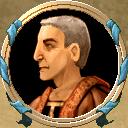

Duke Kálmán: Well guys, we’re in the money these days, thanks to that dolt Salamon... er, I mean, His Majesty the King. The question is, what should we do with it? Any ideas?
Steward Lucja: Sire, if I might be so bold as to speak first, I believe that your policy of careful development of our infrastructure is laudable. There remains much to be done and we should simply continue.
Marshal Sándor: My brother, Slovakia is certainly far ahead of the other parts of Hungary as we all know, and no small thanks to yourself, not to mention my good lady wife. However, mines and libraries do not give us more lands. The Holy Father has called all Christendom to fight the good fight! Why are we sitting here on our backsides? Let us go forth! The barbarous Lithuanians lie right on our doorstep in Birlad, and there remain many lands around the Baltic as yet in heathen darkness.
Spy Mistress Viola: Nay my lord sweetikins...
Duke Kálmán: Please don’t call me that in company, dear...
Spy Mistress Viola: Oops, sorry - I forgot. I was just going to say, with all this cash around, maybe we could, you know, dig out one of Borbála’s old Flamboyant Schemes for assassinating the King - we’d could just about afford it now.
Chancellor Blanche: What? But that would be high treason!
Spy Mistress Viola: Great fun, too, though! Ooh - you know what? Then I’d get to be QUEEN!
Duke Kálmán: Hmmm. And I’d get to be King... Now there’s a thought. It’s true the old boy clearly doesn’t have what it takes to produce an heir. Eight years wedded to his second wife and nary a nipper in sight. But he’s not showing signs of dropping dead any day soon either. And I would like to be sure of sitting on that throne myself...
Chancellor Blanche: King Salamon is fully twelve years older than you, Sire. Is there really such a need to contemplate this dark deed?
Steward Lucja: And the cost, Sire! Think what advances we could make to the realm that would be lost if the money was spent on such a scheme. And what if it was discovered?
Marshal Sándor: My good lady has a point, for once, brother. The risk is great - after all, the man is our own cousin remember. What would the neighbours say...
Chancellor Blanche: “Kinslayer”, they would say...
Duke Kálmán: Yes, yes, well I can see Viola’s proposition isn’t too popular, and I confess that I myself am undecided. I think I shall sleep on it, and I will give my decision tomorrow. Court dismissed!
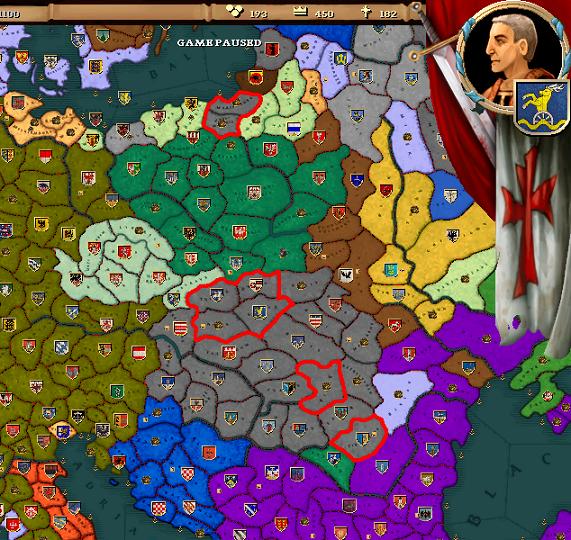
Eastern Europe in 1100, showing the lands of Duke Kálmán
Last edited:

